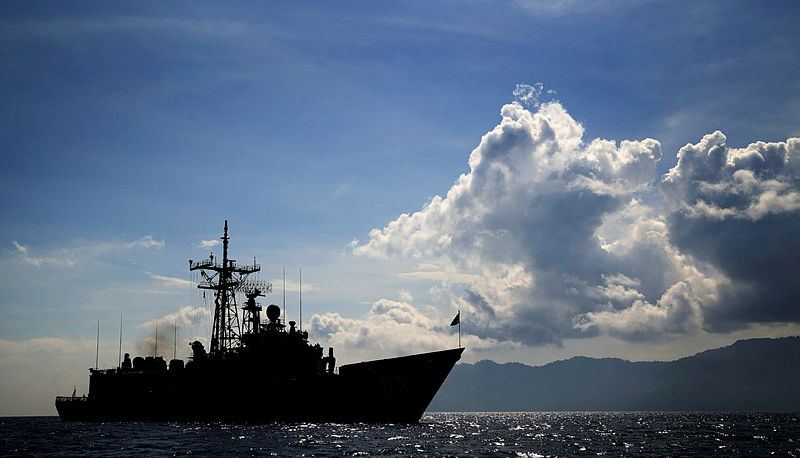Australia and the South China Sea
Posted By John McCarthy on March 17, 2016 @ 06:00

Lately, we Australians have had plenty to say about the South China Sea.
The discussants fall into two broad groups. The first group subscribes closely to the perspectives of the United States Pacific Command and Washington. This group is hesitant to have Australian policy differ from that of the US.
The second group believes that while Chinese expansionist policies shouldn’t be condoned, the South China Sea isn’t primarily Australia’s problem and we should stick to diplomatic approaches to the issues—by which this group means we should talk, not act.
National policy should be selfish. We must decide what to do on the basis of Australian needs, not on what the Americans or Chinese would prefer.
First, we have to be clear in our own minds on whether—as adherents here of the American vernacular like to put it—we have skin in the game or a dog in the fight.
We do. Like most other regional countries, including China, we have an interest in the free flow of commerce—and freedom of navigation—in the area.
Second, stability in the South China Sea counts for everyone in the Asia–Pacific, not only those with territorial claims in, or those countries close to, the South China Sea itself. China has ground to make up and honour to uphold, but it is asserting its claims to regional maritime supremacy at the expense of everyone else.
So, what to do? We must first look in the mirror. If we subscribe to the rule of international law as we claim to, we have to support principles of legal redress with clean hands.
The Philippines has a border dispute with China before the International Permanent Court of Arbitration (PCA). We argue China should follow the determination of the Court.
But we have scant credibility. Australia is one of the relatively few countries which opted out of mandatory dispute settlement under the 1982 Law of the Sea Convention. Given that position, which is at its most salient in our declining to accept PCA jurisdiction in our border dispute with Timor, we aren’t well placed to suggest China should cease bullying less powerful countries on border demarcation issues. To its credit, Labor has suggested it would accept PCA arbitration [1] on our boundary dispute with East Timor if bilateral negotiations failed.
Third, whatever the scope of the Australian interest in the South China Sea, most ASEAN countries have a more direct stake. It’s therefore legitimate for Australia to argue that ASEAN should take a lead and provide a more united and determined front towards China.
But to argue that effectively—and to avoid the perception that we’re seeking to have the ASEANs gang up on China—requires skill. We’d do better to stick to an emphasis on regional transparency and agreed rules of conduct applicable to all rather than to mimic US rhetoric on China. While China is the main aggressor in the South China Sea, it’s not the only one.
Talk alone hasn’t thus far worked in deterring China. If Australia is to be taken seriously as an independent guardian of our own security, we need more than active diplomacy and a loud mouth. We must push back, and the most effective way to do that is through assertion of right of passage.
We should be exercising our right of passage, but subject to qualifications.
First, while commonsense requires prior advice to the Americans, we shouldn’t transit a contested area as part of an American flotilla or squadron, but alone. By doing so, we diminish the argument that we’re merely an American outrider.
Second, we should make these transits through contested areas by practicable routes consistent with meeting normal and lawful Australian security requirements. Examples would be passage via sea and air lanes between Kota Kinabalu and Ho Chi Minh City or a number of approaches to Manila. We shouldn’t portray the transit as a challenge to China.
Third, the foregoing should be done without braggadocio, testing for some in the Australian political class.
That would be an on balance—and hence difficult—decision. Those actions carry risk. It’s all very well for the chest thumpers to tell the government what to do, but imagine if a ship is rammed or an aircraft forced to land—let alone that a vessel is sunk or a plane shot down!
It’s cold comfort that China would probably bear the brunt of international criticism. Apart from a possible loss of Australian lives, we would have a crisis with China which would inevitably be difficult to manage.
And China might impose economic costs.
But we’re now in an era of regional change, uncertainty and risk. We need policies which are dictated by Australian interests and formulated on the basis of independent Australian thinking. Where necessary we have to assert ourselves and act with resolution. There’s a case to be made outside the realms of this note for less subservience to US security policy. This isn’t, however, an argument for blowing with the wind of Chinese ambition.
Article printed from The Strategist: https://www.aspistrategist.org.au
URL to article: https://www.aspistrategist.org.au/australia-and-the-south-china-sea/
URLs in this post:
[1] it would accept PCA arbitration: http://www.abc.net.au/news/2016-02-10/labor-would-renegotiate-maritime-border-with-east-timor3a-tany/7157778
Click here to print.